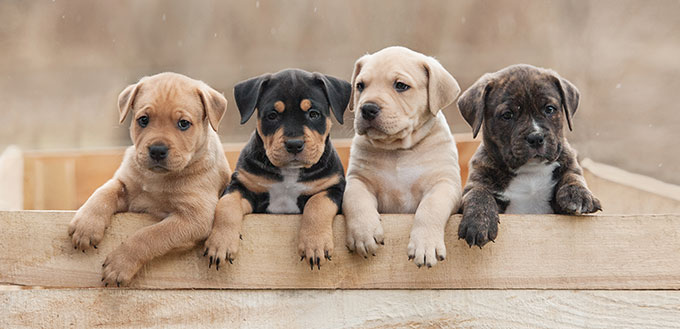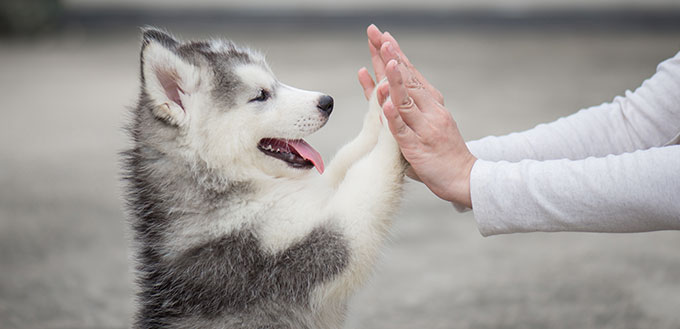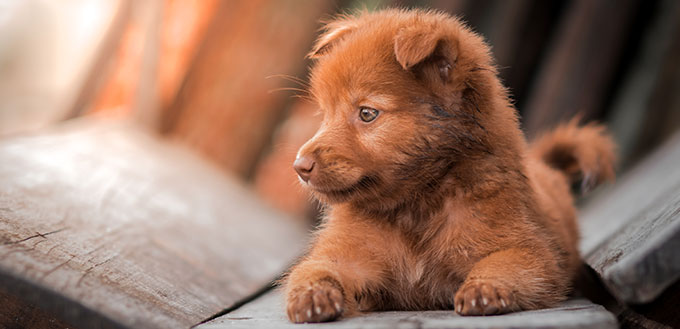When you welcome a new puppy into your family, you probably aren’t looking out for the warning signs of aggressive behavior. Aggressive dogs learn their territorial aggression from their surroundings. They are directly affected by their upbringing, their environment, and the interactions that they have. It doesn’t take much for most dogs to become aggressive, and they do this because they are scared and trying to defend themselves.
When it comes to a puppy’s behavior, aggression is not normal. A Puppy’s aggression tactics will be very obviously different from the normal play that you expect from a puppy, and it’s important for dog owners to be able to tell the difference between puppies that play rough and puppies that over-react aggressively to daily situations.

Why is My Puppy Biting Me Aggressively?
If your puppy is biting you in an aggressive manner, this is a sign that they have aggressive behavior. A puppy’s behavior should not be inherently aggressive, which means that their life before coming to live with your family has forced them to learn that early aggression. Some aggressive behaviors can be breed-specific, just like breeds that show totally normal good behavior with little training.
Aggressive dogs learn to be aggressive. If you believe your puppy is biting you to hurt you, step back from the situation and consider why they believe that you’re a threat. To undo bad behavior, you must first try to understand your puppy and why he or she believes that it’s completely normal for them to try and hurt you when you’re together.
Some reasons that your puppy may behave aggressively are as follows:
- An emotional response to past harm.
- Strong negative emotion, such as your puppy thinking that they are going to be hurt.
- Overly excited rough play.
- Possessive behavior over a toy or food.
The truth may also be in the age of your puppy and how they were reared. Puppies learn how hard they can bite and the responses to their bites from their littermates. Oftentimes, puppies that leave their litter early have trouble with biting and other behaviors. Do you find your puppy possessive of their belongings? This can be a sign of a puppy who hasn’t been properly socialized.
10 Signs of an Aggressive Puppy
Any breed of dog has the potential to become aggressive. When a puppy reacts to an event in a way that you consider aggressive – such as chewing, gnawing, biting, and scratching – your puppy is exhibiting negative behavior and you can consider these aggressive puppy signs.
Warning Signs of Undesirable Behavior Include:
- Dog bites where the bites break the skin
- Chewing on furniture
- Nipping at skin
- Predatory aggression
- Growling
- Suddenly becoming still and rigid
- Guttural barking
- Mouthing
- Tugging at someone to physically move them
- Hitting someone with their muzzle
These ten signs are not normal puppy behavior and are potential warning signs for worse to come. Does your puppy assert any claims to certain parts of your home and act aggressively towards other dogs or people when they are near that area or touching something they’ve claimed? This is textbook puppy aggression, and an aggressive puppy can quickly grow into an aggressive dog. The sooner you can curb your dog’s behavior, the better their future will be.

Reasons Your Dog is Showing Aggressive Behavior
Now that you know how to recognize aggression in your pup’s behavior, it’s time to address the reasons behind this setback in your dog’s progress. We’ve already mentioned that puppies that are taken from their littermates too early have trouble with biting because they learn how to hold back from playing with their brothers and sisters, but that is just one reason that your dog is being aggressive towards your family members.
Fear Aggression
This is a defensive mechanism that your puppy will use when they feel cornered. When your puppy feels like they cannot get away from something that is scaring them, their fear turns into aggression in the form of biting and fast nips.
To help your dog overcome these kinds of aggressive behaviors, you need to learn to understand your dog’s body language and connect with them. Find the thing that is frightening your dog, remove it, and then attempt to calm your dog down.
Puppy Teething
Just because your dog seems aggressive doesn’t mean they actually are. Puppies that are teething can be in a lot of pain, and a dog in pain may show signs of aggressive behavior. When a puppy aggressively mouths at their toys or nearby furniture/clothing, they could be teething.
You may also like our guides on the Best Toys for Teething Puppies and Best Chew Toys for Puppies.
Puppy Protective Behaviors
Puppies can be protective and possessive over their toys and their food bowl. Have you noticed that your pup growls when another dog gets close to their food? Do they snap at you when you’re filling their food bowl up? Your dog is simply being protective of the items in your home that they consider to be theirs. It isn’t ideal behavior and should be something that you attempt to train out of your dog. You wouldn’t want them to snap at a guest, after all.
Puppy Parents
The final reason for aggressive behavior that we’d like you to consider comes from the parents of your puppy. When you adopt a puppy from a breeder, you may not stop to consider the personalities of the parents, but these are as important as the health of the dog you adopt.
When a puppy has aggressive parents, it isn’t unusual to see the puppy exhibit aggressive tendencies, as well. This is even more likely with breeds that are known for being aggressive.
How to Stop Aggressive Puppy Biting
Puppy bites are something that all pet owners experience at one time or another. Like other negative traits, you have the ability to change your puppy’s inappropriate behavior. It may surprise you to know that your puppy is wielding around 28 sharp teeth in their mouth, which can cause damage in seconds if your pup bites hard enough. Puppy aggression that takes the form of biting is unfortunate, but with the right tactics and behavior modification, you can stop this form of dog aggression.
Ways to Stop Your Puppy From Biting
- Give your puppy a range of chew toys, including food-based chews that they can enjoy.
- Make sure you spend enough time playing with your dog each day.
- Give your puppy an area in your home that they can go to when they want to be alone.
- Use baby gates and doors to give you the option to walk away from your dog when they’re misbehaving to get your attention.
- Submit your dog to obedience training with a professional dog trainer.
- Take your dog on walks to the dog park so that they can socialize with other dogs.
- Teach your puppy bite inhibition, which they would have started learning when with their littermates.
Read here our articles on the Best Dog Gates and Best Electronic Dog Doors.
What to Do When Your Dog is Biting You
The best thing you can do for yourself and your family members is to learn to recognize when your dog is going to bite you. We know that sounds hard, but if you can prevent the event before it takes place, you will greatly lower the risk of injury when helping your dog become less aggressive.
If you see your puppy lunge when someone walks past them, they are more than likely about to bite that person. When your puppy reacts this way, it is because they feel threatened. Your pup’s aggressive tendencies come from a place of possessiveness and dog aggression.
In a young dog, you can expect puppy nipping, mouthing, and biting quite regularly. Once you understand why your dog is biting you, you can begin to take immediate and appropriate action each time they bite you, and eventually, train them out of that behavior.
On the other side of this, you also need to know how to deal with the aftermath of a dog bite. This includes treating a wound when the bite breaks the skin and reprimanding your dog in line with their obedience training.
When your puppy bites you, even in a play setting, immediately take yourself away from the situation. This shows your puppy that you don’t want to play with them when they bite you and is a good way to start teaching bite inhibition. To further these lessons, you can yelp and imitate a wounded dog when your puppy bites you – this is the exact same behavior that your puppy’s littermates would have shown after being bitten too hard.
Once you’ve let your puppy know that you’re hurt and not interested in playing anymore, give them some time to calm down before you return to them. If you’ve been bitten hard enough to break your skin, seek medical advice as soon as possible.
How to Socialize an Aggressive Dog
Adult dogs can be socialized just like puppies can. Many dogs are re-socialized as adults because they weren’t properly trained when they were younger. To socialize an aggressive, adult dog, you’re going to need to put in some effort.
Older dogs showing signs of bad behavior are going to require a lot of positive reinforcement to have that behavior trained out of them. Positive reinforcement training gives real and fast results when training dogs of all ages, whether it’s your puppy taking playful teasing too far, or your older dog being aggressive towards your family (especially children).
To start socializing your dog, you should see how they react around just one other dog. This should be a controlled meeting, outside, where both parties have ample opportunity to walk away. Your dog should be on a leash as if you were taking them for a walk like any other day. The other dog in this scenario needs to be a well-trained pup so that they can resist being pulled into a scrap by the untrained dog.
By trying this exercise, you will be able to see how your pup reacts around other puppies and dogs without subjecting them to the many dogs that will undoubtedly be in your local dog park.
After this test, you can continue introducing your dog to more people and animals. Do this slowly, never any faster than your dog is comfortable with, and look out for any early signs of stress or anger.
Consider Dog Training
A dog behaviorist will be able to take your at-home obedience training to the next level. Though there are ample resources online that will tell you the various ways you can train your pup, nothing beats the advice and lessons that an expert can bestow upon you.
Even young puppies can benefit from the training offered by dog trainers. You can easily search online for local obedience schools and trainers who are taking on new dog students. If you happen to have a large dog that needs to have their behavior adjusted, remember to check that the trainers you’re researching cater to larger breeds.
A type of training that you may read about often is clicker training. Clickers can help you get your dog’s attention without raising your voice or showing them how frustrated you’re getting. A clicker is a great training tool – they’re cheap, effective, and portable, so you can carry one anywhere to keep your dog’s focus on you once they get used to the noise and what it means.
Become the Alpha
Something that may sound a bit out there is becoming the alpha of your pack. In a household with several dogs, where you have more than one aggressive dog trying to boss the others around, there needs to be a level-headed pack leader.
A good pack leader will be able to calm a vicious puppy and stop a puppy growling at things they don’t like. They’ll also be able to keep the pack working as a unit. Sometimes this alpha is a well-trained dog, other times the human owner can become a decent enough alpha.
Becoming the alpha does not mean that you become the boss of your dog and they must listen to you without question, but it does mean that you can teach your puppy to respect you and the commands that you give to them.

FAQs:
Q: How do you identify play biting?
A: As a rule, young puppies are more likely to be play biting than doing showing any signs of aggression. It’s rare for a young pup to be aggressive without a reason, so you should consider any biting, mouthing, or nipping to be play biting unless your pup is truly trying to hurt you. Help your dog learn bite inhibition and train them to stop mouthing, and you’ll soon see an improvement.
Q: Do I need to have my puppy examined?
A: If you have tried training your puppy and they don’t seem to be improving, it may be worth taking a trip to your veterinarian to have your puppy examined. Your dog may have underlying conditions that are causing them to be aggressive, bite, and be unsociable. Some neurological conditions in dogs have symptoms that come out as aggressive behaviors.
Q: Why is my puppy exhibiting aggressive barking?
A: When a dog barking in an aggressive way, it’s because they are scared or angry. Fear aggression is a very real trait that dogs show when they feel like they are trapped and can’t get out of the situation. Instead of freezing or cowering, they use their fear to make themselves seem more threatening. A puppy barking like this is distressed, and you should attempt to remove the stressor and calm your puppy down as soon as possible.
Source:
- Warning Signs that Your Pup has a Behavior Problem – The Ohio State University
- Aggression – ASPCA






